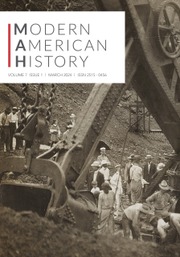Modern American history has long been a field of great vibrancy, but one without a “big tent” journal devoted to its particular themes, challenges, and concerns. When editors at Cambridge University Press canvassed historians about the possibility of creating a publication that could bring scholars together across their various subfields and allow for wide-ranging conversations about the recent past, they found overwhelming enthusiasm. When the press asked us to recruit an editorial board and launch Modern American History (MAH), we were inspired by the possibilities.
For all the variety found in United States history since roughly the 1890s, an overarching set of developments and key problems now animate the field, setting it apart from earlier eras and making the prospect of a dedicated journal especially timely. Such themes include, though are not limited to, the creation of a modern state; the rise and decline of an industrial political economy; the emergence of the U.S. as a world power; rising consumer expectations and life expectancy; accelerating technological and environmental change; the transformation of urban, suburban, and regional landscapes; mass migration amid new legal regulations and border regimes; and the elaboration of modern forms of political rights and personal identity, including new beliefs about how race, gender, class, religion, health, and sexuality inform the national experience.
Each issue of MAH features emerging research on these topics as well as others. The journal's articles follow in the tradition of the well-crafted, peer-reviewed set piece. They often bridge common subfield divides and always advance novel arguments and significant new historiographical claims. MAH also includes a lively “Below the Fold” section with special features and innovative content, a place where writers can share insights that might stray from their main research agendas, and readers, too, can think creatively and engage with the big questions that drive the field.
We hope you enjoy this first issue, and please join us in the future!


